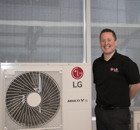Wellbeing – taking a step beyond legislation

Andrew Slater considers the potential impact on specifications of taking into account the true value of wellbeing.
Air conditioning products must meet legislative requirements, of course, in order to be specified. But going further than legislation provides added benefits, particularly when energy performance is improved and operating costs are reduced.
But what about factors that are not covered by legislation? Or which don’t link to life-cycle costing? Increasingly, we are now exploring to product innovations that support occupant health and wellbeing.
The concept of wellbeing is based around a hierarchy of needs of an individual, encompassing physical, social, physiological and environmental factors. The World Green Building Report “Health, wellbeing and productivity in offices” , states that: “Overwhelmingly, research clearly demonstrates that the design of an office has a material impact on the health, wellbeing and productivity of its occupants.” The report also highlights the importance of indoor air quality (IAQ) and thermal comfort.
The same report points to controls as important to wellbeing: “…studies consistently show that even modest degrees of personal control over thermal comfort can return single digit improvements in productivity. The importance of personal control applies to other factors too, including lighting.”
Even though building specifications for HVAC systems are based around design standards, thermal comfort is a condition of mind, assessed by subjective evaluation. It therefore presents a complication for standardisation of system design. However, there are approaches available that can achieve thermal comfort that complies with legislation and also which supports wellbeing.
Thermal comfort is not only about temperature. When designing its latest systems, for example, LG was focused on providing control capabilities for occupants that also took into account dehumidification rates and draught effects. The outcome is an individually-tailored and controlled system that utilises the ability to monitor humidity as well as temperature (hence the name ‘Dual Sensing Control’). This is now included in the LG VRF range.
Traditional comfort cooling and heating products have provided conditioned air through a fixed evaporative temperature that would generically maintain a difference between air on- and off-coil. This means that, as the air on-coil would reduce, so would the air-off in direct proportion, leading to draughts. Moderations to this approach to maximise system efficiencies have involved variable evaporative temperatures but this affects the entire systems operation during the process.
With the LG ‘Comfort Cooling’ feature incorporating Dual Sensing’s temperature and humidity control approach, the user of the product can select a desired room temperature locally. Both sensible and latent loads are monitored and responded to and the difference between air on-coil and air off-coil is not retained in direct relation as the space load reduces. This creates a constant thermostat on condition, providing air off-coil temperatures similar to that of the room. In turn, this maintains the occupants desired local conditions.
By measuring latent loads through humidity monitoring, the dehumidification rate of an area can also be controlled with more accuracy to achieve optimum levels of 30-60% RH. This eliminates discomfort such as headaches and eye strain. It also matches operating conditions to loads exactly, rather than basing operation on sensible loads only, preventing over- or undercooling
By being able to provide solutions to both the physical and physiological aspects of thermal comfort through function adjustment and local environment regulation, productivity of an individual can be found to up to 10% higher (2006 REHVA Guidebook).
The ‘Health, wellbeing and productivity in offices’ report shows that staff costs typically account for 90% of businesses operating costs, so any factor that impacts their ability to produce should be a major concern for any organisation. And this should also impact on cost-based specification. If the true value of the office environment included a calculation for good ‘wellbeing’, then the systems being specified would certainly offer an incentive to go far beyond legislation.
Andrew Slater is senior engineering manager UK and Nordic, LG Air Conditioning







